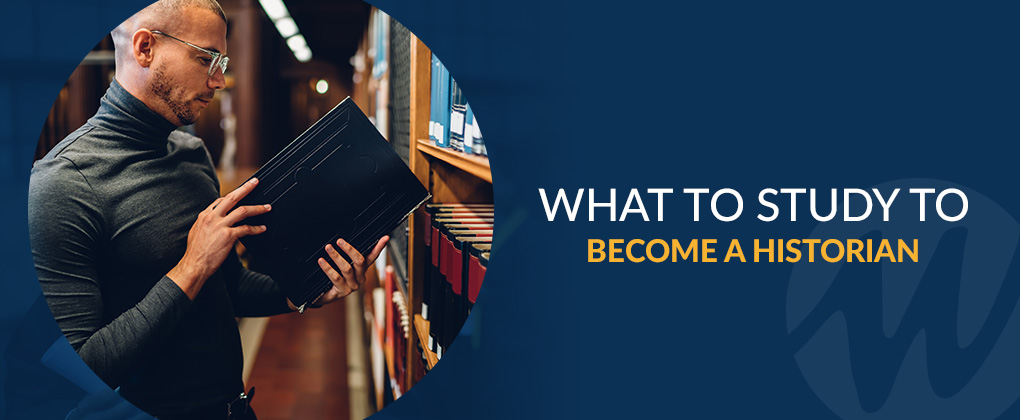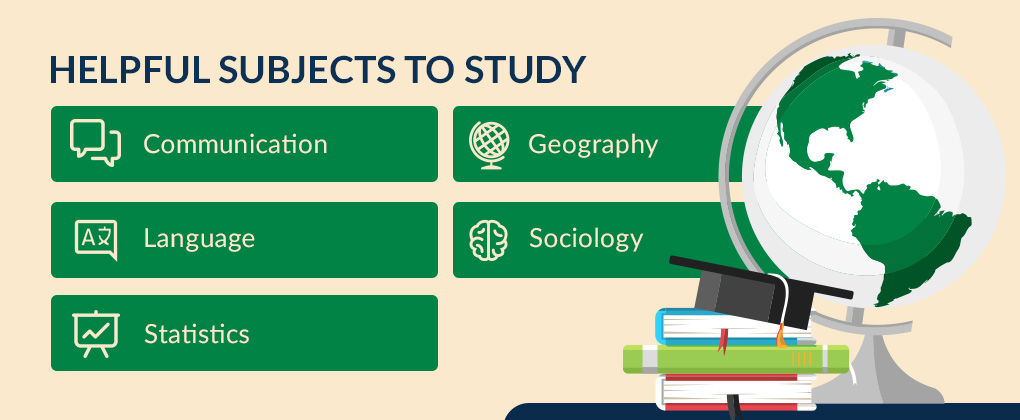
If you consider yourself a history buff or just love learning about the world around you, becoming a historian is an exciting career option to consider. Historians have a unique role that lets them live with one foot in the past and the other in the present, ultimately helping guide society as it learns and evolves.
Let’s review what you have to study to become a historian and what type of experience you need to excel in the field.
What Exactly Does a Historian Do?
To understand what you need to study to become a historian, it helps to break down what these professionals do and where they’re employed. “Historian” is a broad term referring to someone who has studied history and uses their expertise to research, assess or interpret how and why events of the past took place. It’s more than memorizing dates and names of public figures — historians bridge the gap between history and the present day through teaching, advising or analysis.
You’ll find them in a variety of professional roles, such as the following:
- Teacher or professor
- Living history interpreter
- Politician or government official
- Writer or journalist
- Archaeologist
- Anthropologist
- Librarian or archivist
- Museum educator
- Analyst or consultant
What Degree Do You Need to Be a Historian?
Most historians have a master’s degree or Ph.D., and many hold additional degrees in other subjects based on their concentration. While a bachelor’s degree in history is certainly helpful, earning an advanced degree in the subject can be beneficial if you choose your courses well and get plenty of hands-on experience along the way. A bachelor’s degree in political science, humanities or social sciences may also be helpful.
What to Study as an Undergraduate Student
History is an enormous, multifaceted subject, which is why historians typically specialize in a specific subject, era, geographic region, culture or demographic. It’s one of the few professions that is truly customizable — you can combine almost any topic with history to design a path that fits your interests. For example, here are some topics you might specialize in:
- Art
- Law
- Political science
- Anthropology
- Information sciences
- Economics
- Medicine
- Sociology
- Architecture
- Military
- Literary classics
While you don’t have to know your concentration before enrolling in an undergraduate program, it’s a good idea to use that time to explore your options. Take as many history courses and related electives as you can, and note which ones you do and don’t enjoy. Try to think beyond the lecture or class structure when assessing your interests. What homework assignments were your favorite? Which eras, movements, or public figures stuck with you long after class ended?
Because you’ll likely pursue an advanced degree, it also helps to begin your undergraduate career at a community college. This lets you build your educational foundation at a lower cost before finishing your degree at a four-year school. Mount Wachusett Community College’s Global Studies program or History and Political Science program are great places to start if you’re eager to explore other cultures, worldviews, and United States or global history.
Other Helpful Subjects to Study

There’s more to being a successful historian than learning the past. Studying the following subjects through electives or a dual major could be very beneficial:
- Communication: A good historian knows how to communicate effectively in both written and verbal formats. A secondary degree in English or communication would be helpful, especially if you plan to pursue a public-facing role. At the very least, consider taking a public speaking or writing elective to help you build those skills.
- Language: Learning another language opens you up to countless possibilities professionally and academically, especially if you’re interested in global or ancient history. A linguistics degree may also be worth exploring if you’re interested in the idea of how language and history intertwine.
- Statistics: Many historians go on to become consultants or analysts for businesses, nonprofits or government offices. A statistics elective or minor will teach you how to work with quantitative data to better understand historical patterns and make more informed assessments as a professional.
- Geography: Geography and history go hand in hand — plan to take at least one course if you want a better grasp of how people and places shape and relate to each other.
- Sociology: Sociology is the study of society and human relationships, which can equip historians with the context and information to better understand people groups, cultures and the way communities change over time.
Certain advanced degrees also pair well with history, such as library and information sciences or law, and are good to consider once you’ve completed your undergraduate studies.
How to Prepare for Becoming a Historian
There are several actions you can take beyond your coursework to prepare for a career in history.
1. Get Some Field Experience
Hands-on experience is crucial when pursuing a career as a historian. While you’re in college, take advantage of any internships, practicums or field work opportunities that come your way, even if they’re not in your specific area of interest. You should also consider volunteering or getting a part-time position at a museum, historical society or similar. When the time comes to start your master’s degree, a graduate assistantship position can help you gain experience as you go.
You can also start familiarizing yourself with places like local archives to get experience dealing with primary sources and artifacts.
2. Work With a Mentor
Many college students and young professionals benefit from working with a mentor, whether that’s an academic advisor at school or an active professional in the field. Experienced historians can help you decide what you might like to specialize in, provide practical tips for landing a good job and offer valuable perspective about the state of the industry.
3. Expand Your Knowledge and Skill Set
Consider taking classes outside of college to learn new skills or develop existing ones. For example, obtaining a certification in another language or enrolling in an archaeology or preservation workshop can bolster your resume and teach you things you can’t learn in lectures. Grant writing courses are also valuable in this profession.
4. Network With Others
Joining a professional organization, such as the American Historical Association or World History Association, is one of the best ways to stay up to date on industry trends and network with peers and other professionals. You can also attend conferences and seminars to learn more about specific interests or develop skills beyond the classroom. These types of events let you connect with potential employers and organizations and expand your reach.
Let MWCC Be Your Stepping Stone to a Career in History
Becoming a historian is a worthwhile and exciting pursuit, but it also requires a lot of time spent in the classroom. Earning a bachelor’s, master’s and potentially a doctorate degree is a costly investment. Planning early and starting strong at a community college is an excellent way to minimize future debt without sacrificing the quality of your education. Mount Wachusett Community College lets you explore your academic interests and start taking core courses without the hefty price tag.
Many of our students transfer to a four-year school after their time at MWCC, armed with a jump-start on their bachelor’s degree that puts them ahead of the curve. Students also benefit from our Career Services Center, which is here to help you plan your professional path.
Request more information today, or schedule a campus tour to see why MWCC is right for you.


